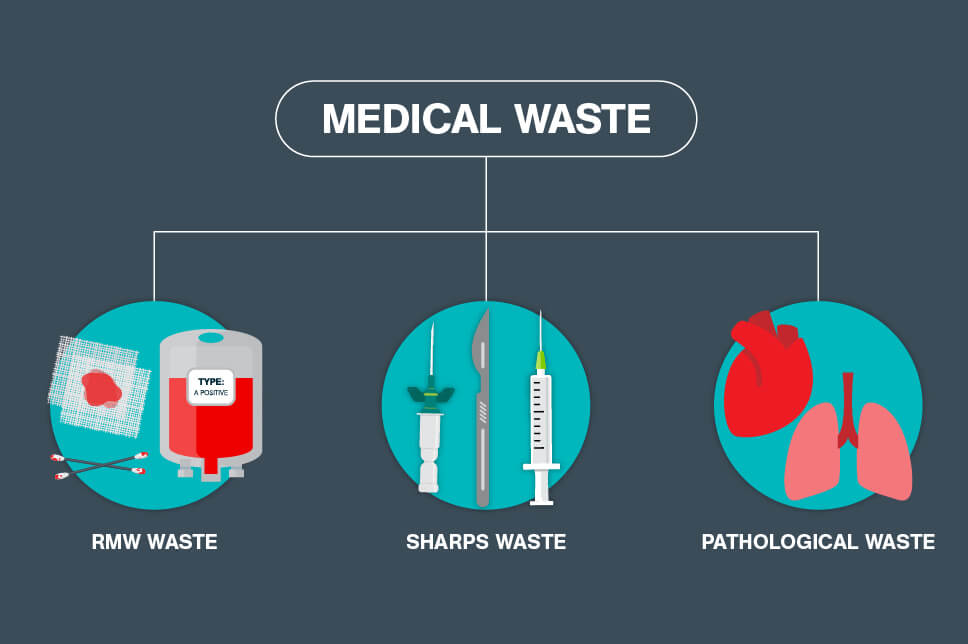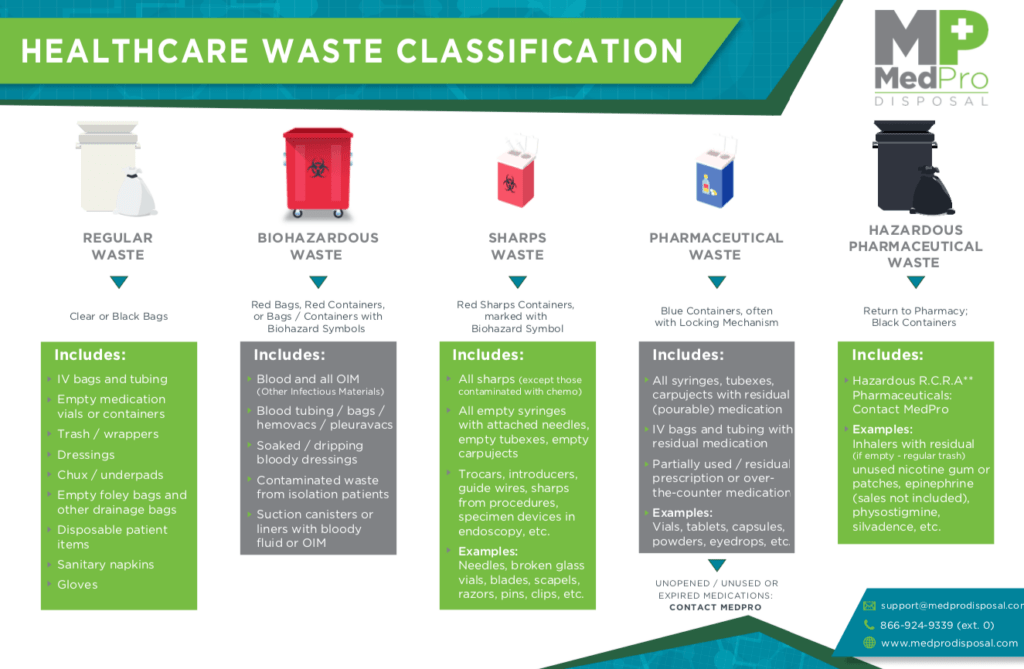The Value of Appropriately Handling Clinical Waste
Correct administration of medical waste is of utmost significance in healthcare centers. The handling, storage, and disposal of medical waste require strict adherence to standards and regulations to guarantee the safety and security of clients, health care employees, and the atmosphere. Incorrect monitoring of clinical waste can pose significant wellness dangers, including the transmission of contagious conditions and injuries from sharp items. Improperly disposed of medical waste can have harmful effects on the environment, infecting water sources and dirt. Healthcare centers have regulative and legal responsibilities to appropriately handle clinical waste, and failing to conform can result in charges and lawful consequences. By carrying out ideal techniques for secure handling and disposal of medical waste, healthcare specialists can mitigate these risks and add to a much safer and healthier environment for all. Adequate education and training on waste administration are important for medical care professionals to accomplish their duties in this field.
Health And Wellness Threats Related To Improper Waste Management
Improper management of clinical waste poses substantial health and wellness threats to both healthcare employees and the general public - WasteX Medical Waste Disposal. Medical waste, that includes sharps, contagious products, drugs, and radioactive substances, needs appropriate handling and disposal to stop the spread of infections, injuries, and exposure to damaging compounds
Among the main health risks linked with incorrect clinical waste management is the transmission of transmittable conditions. Healthcare employees that enter into call with infected waste may get illness such as HIV, hepatitis, or other bloodborne virus. Likewise, if medical waste is not correctly thrown away, it can pollute the setting, water sources, and also food, leading to the spread of diseases within the area.
Improper waste administration can likewise result in injuries, particularly from sharps such as needles, scalpels, and busted glass. Accidental needle punctures can lead to the transmission of bloodborne diseases, while cuts from sharp objects can cause serious wounds and infections.
Furthermore, the improper disposal of pharmaceutical waste can result in the contamination of water materials. When expired or extra medicines are flushed down the bathroom or disposed of inappropriately, the chemicals can seep into water sources, influencing aquatic life and potentially getting in the human food chain.
Ecological Effect of Poorly Disposed Medical Waste
Among the substantial effects of inadequate monitoring of medical waste is its destructive effect on the setting. Poorly disposed medical waste poses a significant risk to ecosystems, water bodies, and the total equilibrium of the atmosphere. WasteX Medical Waste Disposal. The unsafe materials contained in clinical waste, such as infectious representatives, pharmaceuticals, and chemicals, can infect water, soil, and air, causing extensive air pollution and degradation
When clinical waste is not appropriately segregated, treated, and disposed of, it can discover its method into water bodies through incorrect land fill practices or prohibited discarding. This can result in the contamination of groundwater and surface area water, impacting aquatic life and potentially polluting alcohol consumption water resources. The release of harmful chemicals and drugs right into the environment can interfere with ecological communities and injury both animal and plant types.
Furthermore, improper incineration of clinical waste can release hazardous contaminants, including dioxins and furans, into the atmosphere. These toxins have actually been connected to various health and wellness problems, including respiratory troubles, reproductive problems, and even cancer. The launch of greenhouse gases during incineration also adds to climate change.
To alleviate the environmental influence of poorly disposed medical waste, it is vital to carry out appropriate waste administration practices. This includes partition of waste at the resource, ideal therapy techniques, and risk-free disposal strategies. By doing so, we can lessen the air pollution and safeguard the atmosphere from the unsafe effects of medical waste mismanagement.
Legal and Regulative Responsibilities for Healthcare Facilities
In order to attend to the environmental influence of improperly disposed clinical waste, medical care centers are required to stick to governing and legal obligations. These commitments are established to make sure the correct handling, storage space, transport, and disposal of clinical waste in a environmentally liable and safe fashion.
One of the vital lawful responsibilities for medical care centers is to get the needed licenses and licenses for managing medical waste. This includes obtaining a waste generator recognition number and following federal, state, and regional policies. Health care facilities must also maintain detailed records of the types and amounts of clinical waste created, in addition to the approaches made use of for its disposal.
Additionally, health care centers have to implement appropriate partition and product packaging treatments for different sorts of medical waste, such as sharps, contagious waste, and pharmaceutical waste - medical waste disposal. This includes using leak-proof containers, biohazard bags, and sharps containers that fulfill regulatory requirements
Medical care facilities are likewise in charge of making sure that their personnel get ideal training on the appropriate handling and disposal of medical waste. This consists of training on infection control, individual safety tools, and waste monitoring methods.
Ideal Practices for Safe Handling and Disposal of Medical Waste
To guarantee the secure handling and disposal of medical waste, health care centers need to implement ideal practices. These practices are necessary to secure the health and wellness of both healthcare workers and the public. The correct monitoring of medical waste is important in stopping the spread of contagious conditions and decreasing environmental contamination.
Among the very best methods for risk-free handling and disposal of medical waste is partition. Medical care facilities need to separate various types of clinical waste, such as sharps, infectious materials, and pharmaceutical waste, to protect against cross-contamination. Correct labeling and color coding of waste containers additionally play a crucial role in guaranteeing the correct partition of medical waste.
An additional vital best method is the use of proper containers for saving and carrying medical waste. These containers need to be leak-proof, puncture-resistant, and appropriately secured to protect against any kind of feasible release of hazardous materials. Furthermore, healthcare centers must establish clear methods for the collection, storage space, and transport of clinical waste to lessen the danger of exposure and contamination.
Additionally, health care centers have to train their team on the appropriate handling and disposal of medical waste. Regular training sessions and correspondence course should be conducted to keep medical care workers updated on the most recent laws and standards. This will certainly assist make sure that every person associated with the procedure knows the prospective dangers and is equipped with the essential understanding and abilities to take care of clinical waste safely.
Education And Learning and Training for Health Care Professionals in Waste Management
Medical care experts call for detailed education and training in waste management to make certain the proper handling and disposal of clinical waste. The administration of clinical waste is a crucial element of health care operations as it directly influences the health and wellness of both medical care workers and the public. Proper education and learning and training outfit health care specialists with the necessary expertise and skills to deal with and get rid of of medical waste in a risk-free and ecologically responsible manner.
Education and training programs for medical care specialists in waste management cover a range of topics, consisting of the category and partition of medical waste, correct product packaging and transportation, storage space and labeling demands, and making use of personal safety tools. These programs additionally stress the value of adherence to neighborhood, nationwide, and worldwide guidelines and standards governing medical waste administration.
By getting thorough education and learning and training in waste administration, medical care specialists can efficiently minimize the dangers connected with clinical waste, such as the transmission of transmittable diseases and the prospective harm to the environment. WasteX Medical Waste Disposal. In addition, trained professionals can recognize and apply best methods that advertise sustainability and reliable waste management techniques within medical care centers.
Constant education and learning and training in waste management ought to be a recurring priority for health care experts, as waste management practices and guidelines may develop over time. By staying up-to-date with the most up to date growths in waste monitoring, healthcare experts can make sure that they are outfitted with the knowledge and abilities essential to make Resources informed decisions and add to the total enhancement of waste monitoring methods in health care settings.

Final Thought
To conclude, correct management of clinical waste is vital to reduce wellness threats and lessen the environmental effect. Healthcare facilities have governing and legal obligations to guarantee secure handling and disposal of medical waste. Complying with finest practices and giving education and training for healthcare professionals in waste administration are important for keeping a safe and healthy setting. By sticking to these guidelines, medical care facilities can safeguard public health and protect the stability of our ecosystems.

Medical care specialists require thorough education and learning and training in waste administration to ensure the proper handling and disposal of clinical waste - medical waste disposal. The monitoring of medical waste is an important component of healthcare operations as it straight influences the health and wellness and security of both health care employees and the general public